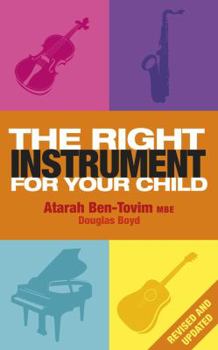The Right Instrument for Your Child
Select Format
Select Condition 
Book Overview
Did you know nine out of ten children could succeed in learning a musical instrument? This unique guide offers a practical system for selecting the right instrument for your child. Starting from the... This description may be from another edition of this product.
Format:Paperback
Language:English
ISBN:1409138127
ISBN13:9781409138129
Release Date:September 2012
Publisher:Orion Publishing Group
Length:163 Pages
Weight:0.50 lbs.
Dimensions:0.6" x 5.2" x 8.4"
Customer Reviews
3 ratings
Very useful!
Published by Thriftbooks.com User , 16 years ago
An excellent book with many usable advices how to choose appropriate instrument. Detailed descriptions of nearly all "classical" instruments (except for accordion), with guidelines regarding child's physical, mental and social characteristics. I consider this book very useful for parents, as well as for adult (amateur) musicians who want to better know characteristics of different instruments.
Scary accurate for me!
Published by Thriftbooks.com User , 17 years ago
I started piano at the age of almost 5, and had 11 subsequent years of lessons. Alongside, I played 2 yrs of violin, followed by 3 yrs of flute, and found my love between the summer of 8th and 9th grade on the oboe. I still occasionally play piano, flute and oboe today, and my 9 year old daughter is now playing my violin. What I found interesting about this book is it really seemed so accurate, given my family history! My brother, who didn't start piano until 9 yrs of age, is a far more accomplished pianist than I am, even though I took more years of lessons. My daughter has accomplished in 2 years what it took me over 4 years to do because she started when she was older. This book speaks strongly about delaying the start of piano lessons, and based on my experiences, I would have to concur. The scary chapter for me was about the oboe. They STRONGLY discourage a child from playing it, and say it's a self selecting instrument at about the age of 14. EXACTLY ACCURATE for me. They say stubborn, tight lipped children do best; socially, oboists largely keep to themselves. Right on the money, in my experience. Now that I'm helping my children select their instruments, it's been very helpful to read th is book again and again. I highly recommend this one!
presents a good method for selecting an instrument
Published by Thriftbooks.com User , 17 years ago
This is an interesting guide. I never gave much thought to personality factoring into instrument choice, and the authors make this a primary consideration. The book has a checklist to gauge your child's personality, although I found it tricky to pick between traits such as academic or creative, serious or fun seeking. My children behave differently according to circumstances, and this type of black and white labeling was a challenge for me. Nevertheless, I found it extremely helpful to follow the exercises and think about personality, physical aspects, and academic interests. According to the book, the French Horn is better for thin to medium lipped children, while the trombone has a larger mouthpiece and is easier for bigger lips to blow. The piano may not be good for extremely social kids, as it takes many years before they can play in an ensemble. These are good things to factor in when making this important decision. The authors believe that a child should be reading fluently and doing basic math operations before taking up an instrument. Obviously, this means that they do not advocate having a preschool child take up an instrument. Their idea is that kids should be exposed to music early on, but not attempt serious study until age 7, 8, or later. There is discourse relating to how intense the requirement for parental involvement in Suzuki style lessons, though the book does not actaully come out as overtly Suzuki bashing. The authors also state that a child may give up after a short time or a few years if the instrument is not the correct match. Their message is that the proper instrument will provide a lifelong hobby or career.






